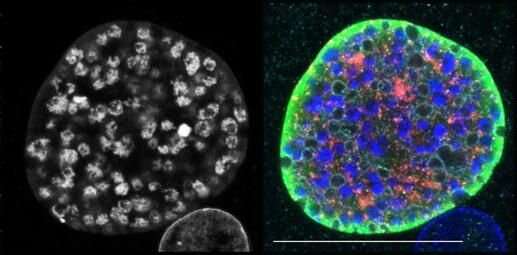Thousands of malaria parasites in a human liver cell. Credit: The Francis Crick Institute
A new method to control the timing of gene deletion in the malaria parasite has been developed by researchers at the Crick, which could lead to better vaccines.
The new study, published in mBio, provides a new way for researchers to delete genes from the malaria parasite at different stages in its lifecycle. This will help scientists to better understand the genetics of the disease, and could allow researchers to engineer malaria parasites with a 'self-destruct' button for safer and more effective vaccinations.
Malaria is one of the world's most deadly diseases, causing an estimated 219 million cases and 435,000 deaths in 2017. More than 95 percent of these cases are caused by the parasite Plasmodium falciparum.
The malaria parasite is difficult to study as it has multiple life stages: infecting a mosquito; being passed to a human host; invading cells in the human liver where it reproduces; then spreading through the body in the bloodstream, from where it is taken up by a new mosquito and transmitted to a new person. A common method for studying the function of a gene is to 'delete' it from the genome, to see which processes it is involved in. However, many malaria genes are essential for the parasite to grow in cell culture where the genetic modifications are made, so it is impossible to study their function in later stages.
Using sophisticated genome-editing techniques, the team devised a new method to control when a gene is deleted. They created a 'switch', so that selected genes are only deleted when the drug rapamycin is introduced. This allows them to study gene function at different stages of its lifecycle.
"This opens up a whole new route for researchers to examine this parasite's genes and understand more about their function and importance," said lead author Marta Tiburcio, a postdoc at the Crick. "A gene that is vital to the organism during its early life can now be studied in greater depth than ever before, to see what role it may play in later life stages. This is also important for finding the best drug targets which ideally are important in all lifecycle stages."
To test the method, the team applied it to the AMA1 gene, which may have functions that have not yet been identified. It is known to be important for the invasion of red blood cells, and they hope to further investigate its role in later stages with the new method.
"Current vaccines are not efficient and resistance to all treatments of malaria has been observed," said Moritz Treeck, group leader at the Crick's Signalling in Apicomplexan Parasites Laboratory. "By being able to delete genes at later stages of malaria's lifecycle, new vaccines may be developed in the form of weakened parasites that allow the body to develop a strong immune response.
"At the moment, live vaccinations use a modified strain that dies shortly after reaching the liver. However, this means the immune system isn't 'trained' to deal with the parasite in later life stages, so the vaccine is less effective. If we could engineer a modified malaria parasite that loses vital genes at the end of its lifecycle, that would be very exciting indeed. Such an approach is still at least a decade away, but this takes us one step closer."
More information: Marta Tibúrcio et al. A Novel Tool for the Generation of Conditional Knockouts To Study Gene Function across the Plasmodium falciparum Life Cycle, mBio (2019). DOI: 10.1128/mBio.01170-19
Journal information: mBio
Provided by The Francis Crick Institute























